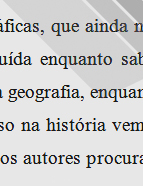

................................
From the start of his research career, Vitorino Magalhães Godinho displayed a marked interest in geography.
In 1947, his História Económica e Social da Expansão Portuguesa [Economic and Social History of Portuguese Expansion], which was limited to Morocco (vol. I, the only volume published), and his study " A Economia das Canárias nos Séculos XIV e XV " ["The Economy of the Canar y Islands in the 14th and 15th centuries"] (1 952) and the “Mediterrâneo” Saariano e as Caravanas do Ouro. Geografia Económica e Social do Sáara Ocidental e Central do XI ao XVI Século [The Saharan" Mediterranean" and the Caravans of Gold: Economic and Social Geography of the Western and Central Sahara from the 11th to the 16th Century] (1956), featured carefully constructed texts on economic geography, accompanied by purpose-drawn maps. And that was not all. In his works, especially those dating from the 1940s and 1950s, geography was consistently and clearly present. In the following decades, his focus shifted more towards sociology and other areas of the social sciences, yet geography can still be detected as an implicit element in his works. His attempt to integrate concepts led to his proposal of Noções Operatórias na Abordagem Global das Sociedades [Operative Notions in the Global Approach to Societies] where he proposed a way of “approaching a singular reality, which is both the individual man and humanity as a whole.” (Godinho, Noções, p. 174).
However, as a historian keenly aware of the needs of an educated audience and students, it was Vitorino Magalhães Godinho, along with a commercial company unrelated to the university or academic circles, who was responsible for the Panorama da Geografia [Panorama of Geography] series, published by Edições Cosmos from 1952 to 1957. The coordinator was joined by collaborators Alfredo Fernandes Martins and Joel Serrão. The series included a collection of translated works from French: Emmanuel De Martonne's Traité de Géographie Physique, Lucien Febvre's La terre et l’Évolution Humaine, Pierre George's Démogéographie, J. J. Juglas's Géographie économique, and an appendix on economic geography by Henri Hauser. The initial project also included references to social, political, and cultural geography. In any case, it was the most enriching bibliographic enterprise to have been received by the scientific discipline in Portugal during the mid-20th century.
